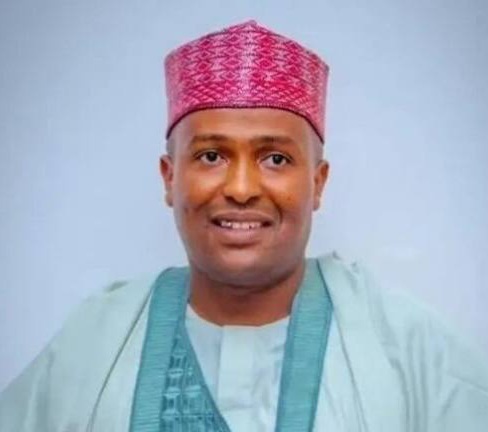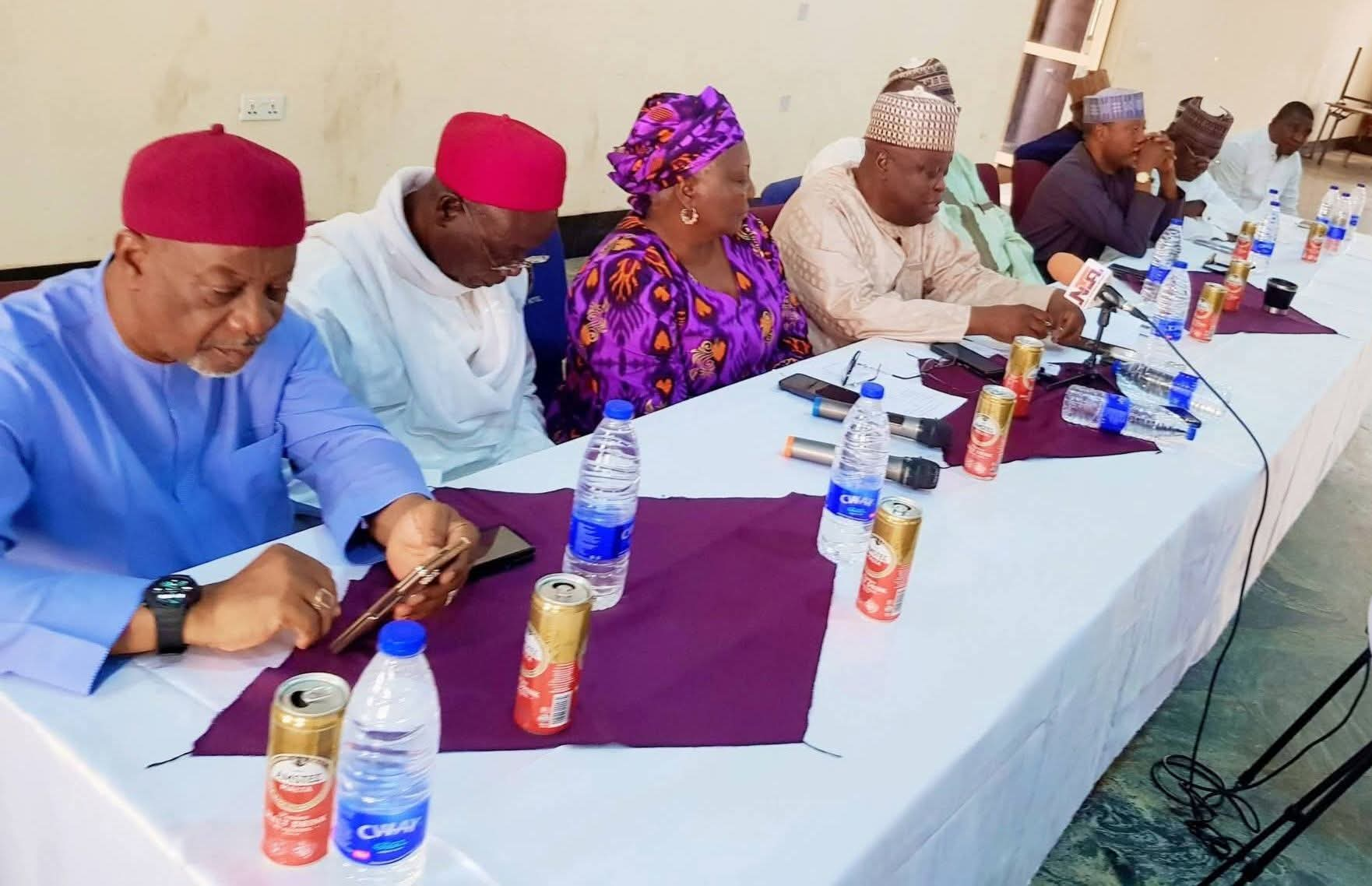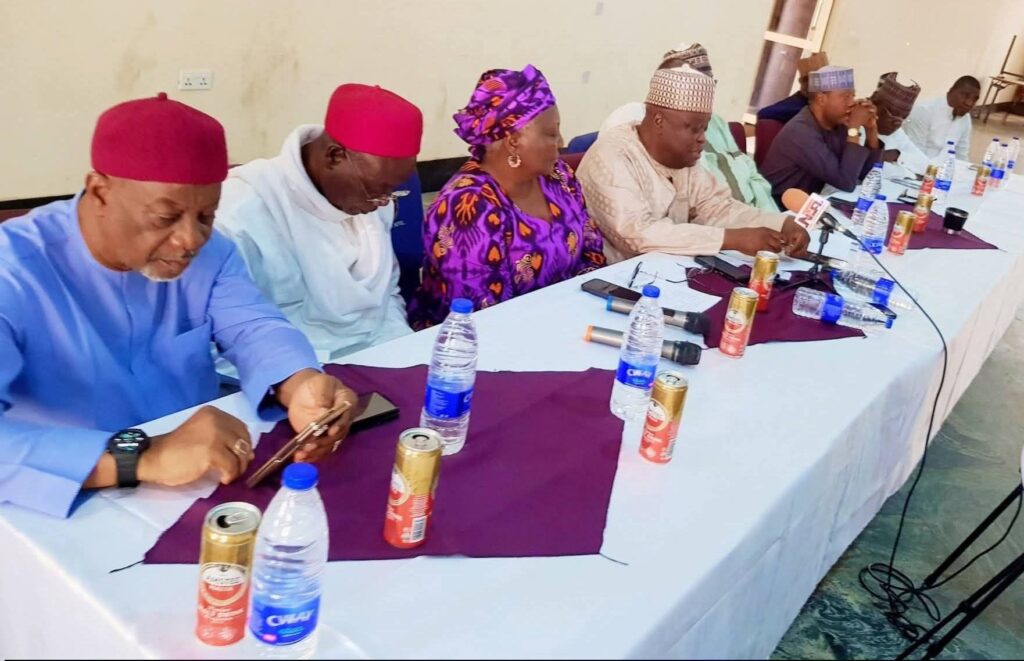News
I Don’t Owe Senate Any Apology
Ibrahim Idris, inspector-general of police, says the force he leads does not owe any individual or group any apology in discharging its duties.
He said this while responding to the comments made by senators over his refusal to honour the invitation of the senate.
Idris has refused to appear before the senate on three different occasions.
He had been summoned over the growing insecurity in the country and the case of Dino Melaye, senator representing Kogi west.
Melaye is currently in custody of the police.
The first time the IGP was invited to appear before the senators, he accompanied President Muhammadu Buhari to Bauchi state but sent representatives who were rejected by the lawmakers.
The second time, the IGP said he went to Birin Gwari, Kaduna state, on a working visit.
When he failed to show up on Wednesday, the senate went into a closed door session after which Senate President Bukola Saraki said Idris had been declared an enemy of democracy.
But responding on Wednesday night, the IGP accused the lawmakers of attempting to witch-hunt him, vowing not to be intimidated.
He asked the public to disregard the statement of the senate and promised to continue to discharge his duties to the best of his ability.
Idris accused the legislators of trying to blackmail him because of the case of Melaye.
Idris spoke in a statement issued on his behalf by Jimoh Moshood, spokesman of the police.
Below is the statement:
The attention of the Nigeria Police Force has been drawn to the media reportage of the Senate’s resolution on Senate Order Paper of today, Wednesday, 9th May, 2018 after a closed door session that the “Senate declares the Inspector General of Police, IGP Ibrahim k. Idris, NPM, mni, as enemy of democracy and unfit to hold any public office within and outside the country”.
It is urgently imperative that the Nigeria Police Force respond to this resolution of the Senate which is a deliberate blackmail, witch-hunting, unfortunate and mischievous.
In accordance with the extant laws in Nigeria, the functions, duties and responsibilities of the Inspector General of Police as stated in Section 215(1a) of the Constitution of the Federal Republic of Nigeria 1999 as amended, and the Police Act and Regulations Section 309(1) can also be carried out as mentioned in sections 7(1),312(1), 313(2) of the Police Act and Regulations by a senior officer of the Force of the Rank of Deputy Inspector General of Police or an Assistant Inspector General of Police who if permitted by the Inspector General of Police to act on his behalf or represent him in an official capacity at any official function, event or programme within and outside Nigeria can do so in consonant with the provisions of the Police Act and Regulations.
It is on the basis of the above that when on the 25th of April, 2018, the Senate invited the Inspector-General of Police to appear before it on the 26thof April 2018, in respect of the felonious offenses for which Sen. Dino Melaye was taken into Police custody, investigated and arraigned in a Court of Competent Jurisdiction in Lokoja, but because the Inspector-General of Police was on official assignment with the President of Federal Republic of Nigeria to Bauchi on same date, he delegated the Deputy Inspector-General of Police, Department of Operations, Assistant Inspector-Generals of Police and some Commissioners of Police conversant with the matter to brief the Senate.
The delegated Officers went with a brief of the Inspector-General of Police on the matter to the Senate to enable the Senate appreciate the issues raised to guide their resolutions on the matter but the Senate refused to listen to the Officers delegated by the Inspector-General of Police in line with his powers recognized by both the Constitution and the Police Act and Regulations.
The Senate again on the 26th of April 2018 wrote the Inspector-General of Police re-inviting him to appear before the Senate in person on the 2nd of May, 2018 but this

News
Kano Assembly Speaker Jibril Falgore Leads 21 Lawmakers Out of NNPP After Governor’s Exit

The Speaker of Kano State House of Assembly, Jibril Ismail Falgore, alongside 21 other legislators, has formally resigned from the New Nigeria People’s Party following Governor Abba Kabir Yusuf’s departure from the political platform.
The mass resignation, announced on Saturday, includes the Deputy Speaker, Muhammad Bello Butu-Butu, Majority Leader Lawan Hussain, and other principal officers of the state legislature, signaling near-total collapse of NNPP structures in the assembly.
According to a statement released by the Chief Press Secretary to the Assembly, Kamaluddeen Sani Shawai, the lawmakers declared total support for Governor Yusuf, who had exited the party just 24 hours earlier alongside eight federal lawmakers and all 44 local government chairmen in the state.
The defecting legislators include Deputy Majority Leader Garba Shehu Fammar, Chief Whip Muddasir Ibrahim Zawachiki, Majority Whip Zakariyya Abdullahi Nuhu, and lawmakers from constituencies across Kano including Ajingi, Albasu, Bagwai/Shanono, Bebeji, Bunkure, Dawakin Kudu, Fagge, Gabasawa, Garko, Gwale and Karaye.
The statement emphasized that the Kano State House of Assembly had verified and authenticated the complete list of defecting lawmakers to properly inform the public and clarify their political position following the governor’s resignation from NNPP.
The legislators reaffirmed their unwavering commitment and loyalty to Governor Yusuf’s administration despite the political realignment, pledging to continue supporting the policies and programmes being implemented across the state.
Governor Yusuf had communicated his decision to leave NNPP in a letter addressed to the party chairman of Diso-Chiranchi Ward in Gwale Local Government Area, effective January 23, 2026, citing persistent internal disputes and legal challenges that have undermined party stability.
In the resignation letter, the governor expressed appreciation to NNPP for the platform and support extended to him since joining in 2022, while acknowledging that deepening internal divisions had created an untenable situation requiring decisive action.
The NNPP Secretary of Diso-Chiranchi Ward, Kabiru Zubairu, acknowledged receipt of the governor’s resignation while commending his achievements in infrastructure development, urban renewal, healthcare delivery, education and economic empowerment during his time in office.
Zubairu admitted the existence of lingering internal challenges within the party and stated that NNPP had no option but to accept the resignation, describing Governor Yusuf as one of the most outstanding governors produced by the political platform.
The wave of defections marks a dramatic political shift in Kano State, where NNPP had dominated since the 2023 elections under the influence of Senator Rabiu Musa Kwankwaso and the Kwankwasiyya movement.
NNPP national officials have condemned the development, labeling it a betrayal of the sacred trust given by Kano voters. National Publicity Secretary Ladipo Johnson dismissed claims of irredeemable party crisis as baseless, while Kwankwaso declared he is not for sale and would not compromise his principles.
News
Singer TIME Drags Georgina Onuoha Over Comment on Davido’s Father’s Reaction to Paternity Saga

Nigerian singer, TIME has publicly called out Nollywood actress Georgina Onuoha following her criticism of Davido’s father, Dr. Adedeji Adeleke, over his reaction to the ongoing paternity controversy involving the Afrobeats superstar.
The drama began after Georgina Onuoha questioned why Davido’s father appeared to defend his son amid allegations that he welcomed a child with a woman identified as Anu Adeleye. In a post shared online, the actress described Davido as “irresponsible,” sparking mixed reactions across social media.
Reacting to her comment, TIME took to X (formerly Twitter) to drag the actress, accusing her of ignoring key details surrounding the case. He referenced statements made by Davido, noting that he had never met the said lady before the first DNA test, and questioned why people were not discussing other individuals mentioned in the saga.
“Madam Georgina, did you hear the part Davina said she’d never met her prior to the first DNA test? Why are y’all not talking about the bank official the girl mentioned to Dr. Sikiru Adeleke?” TIME wrote.
According to reports, Aanu’s mother has been identified as Grace Ayotomide Labinjoh, who has consistently maintained that Davido is her daughter’s biological father despite the singer and his family denying the claim.
TIME’s remarks triggered a fresh wave of debate online, with some social media users backing him for defending Davido’s family, while others accused him of unnecessarily attacking Georgina Onuoha.
As the paternity saga continues to trend, the clash between TIME and Georgina Onuoha has added another layer of controversy, keeping Davido and his family at the center of public discourse.





News
Nasarawa ADC Suspends State Chairman Over Alleged Anti-Party Activities, Sets Up Disciplinary Committee

The African Democratic Congress (ADC) in Nasarawa State has suspended its State Chairman, Godwin Alaku Williams, over alleged involvement in anti-party activities.
The suspension was approved by the party’s Transitional Leadership Team (TLT) following a petition accusing Williams of actions deemed harmful to the unity and progress of the party in the state.
The decision was taken at a TLT meeting held on Wednesday at Otunsha Hotel, Keffi, and presided over by the party leader, Chief John Michael Abdul.
In a statement issued by the party’s spokesperson, Comrade Idris Ojoko, the suspension will last for 14 days, pending investigation and the outcome of proceedings by a disciplinary committee constituted by the TLT.
Ojoko also announced the appointment of Barrister Paul Magaji Ajeh, formerly the State Secretary, as Acting State Chairman, while Umar A. Babayaro has been named Acting Secretary.
According to the statement, the allegations against Williams include his alleged refusal to recognise the party’s National Working Committee (NWC) led by Senator David Mark, and his failure to integrate coalition members into the ADC party structure in Nasarawa State.
Other accusations include allegedly reporting some party leaders to the Independent National Electoral Commission (INEC), the Department of State Services (DSS), and the Nigeria Police, describing them as impostors.
Williams is also accused of constituting parallel party organs at various levels within the state, interfering with the establishment of party offices at the state, local government, and ward levels contrary to NWC directives, and disrupting the ongoing membership registration and revalidation exercise.
Meanwhile, Ojoko announced the formation of a disciplinary committee chaired by Barrister Hassan Yakubu. Other members include Amina Zanwa, Mamman Sunday, and Yunus Abdullahi Sidi, with Gaza Mark Auta serving as Secretary.

-

 News2 years ago
News2 years agoHardship: We Plan To Establish A National Commodity Board To Crash Food Prices – VP Shettima
-
News8 years ago
Blog Reader; Samson Osagiede Celebrates Fiancè Benedicta Daniels’s Birthday With Sweet Words
-
Home9 years ago
News Channel claims Donald Trump is an orphan from Pakistan,share alleged childhood photo
-
Home9 years ago
Another $175m Found in Patience Jonathan’s wife’s firm’s Bank Account
-
Home9 years ago
Oil Spillage: House of Reps Member Shares Photos of the Water her Constituents Drink .
-
Home9 years ago
Zara Buhari & Ahmed Indimi’s Wedding Access Card
-

 Sport7 years ago
Sport7 years agoModric, Marta Wins 2018 FIFA Best Player Of The Year Awards ⚽️
-
News8 years ago
The Best Video You’ve Seen Today?
